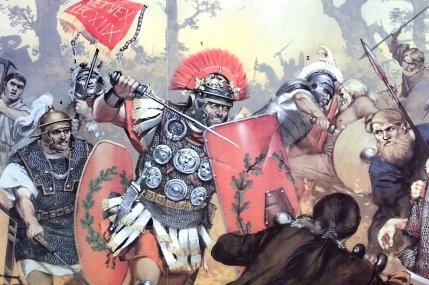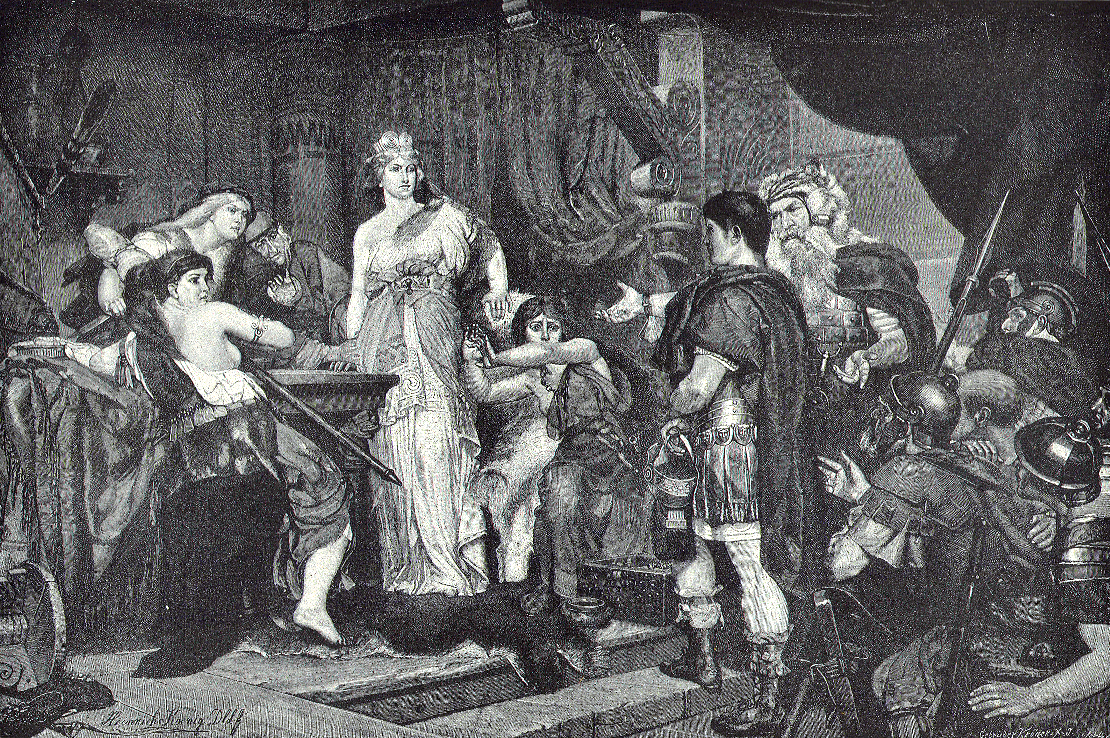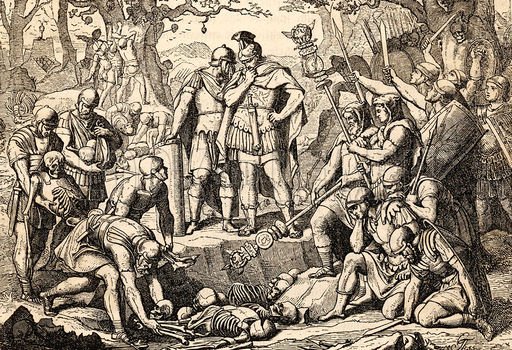ENEMIES OF ROME 6.7 - ARMINIUS - Revenge
In 13AD, Caius Julius Caesar (whom i’ll call Germanicus from now on) was conferred the mission to avenge the defeat of Varus. Soon after arriving there, the news of the death of Augustus sends the legions in a mutinous mood and Germanicus must do his best to crush the mutiny. When it’s done, he is free to lead them into Germania in a punitive campaign
A path of destruction
One of the way to smooth things over with the over-burdened, demoralized and under-paid legions of the Rhine, was for Germanicus to promise plunder and riches from the tribes they would attack and he was true to his words, as is said in Tacitus’ Annals:
The Roman soldier would help himself to German lands and come back dragging German wives. The omen was welcome: the enemy's women and his money were marked down for prey!
It was by no mean a war of conquest but a war of revenge, aimed directly at leaving no doubt in the mind of the Germans that Teutoburg would never happen again.
Caesar, to spread devastation widely, divided his eager legions into four columns, and ravaged a space of fifty miles with fire and sword. Neither sex nor age moved his compassion. Everything, sacred or profane, the temple too of Tamfana, as they called it, the special resort of all those tribes, was levelled to the ground. There was not a wound among our soldiers, who cut down a half-asleep, an unarmed, or a straggling foe.
Call for Help
This rampant destruction threw the Germanic tribes into chaos but if Arminius was able to maintain control over most of them, there was one man he could not control and it was his own father-in-lawy, Segestes, the man whose daughter he had stolen, and the one who had tried to denounce him to Varus.
Segestes was against this war and Arminius tried to silence him by besieging him and his people. Segestes then sent a request for help to Germanicus, who quickly obliged, too much aware of the political weight such a feat would have. But there was to be an even bigger prize:
A battle was fought against the besiegers and Segestes was rescued with a numerous band of kinsfolk and dependents. In the number were some women of rank; among them, the wife of Arminius, who was also the daughter of Segestes, but who exhibited the spirit of her husband rather than of her father, subdued neither to tears nor to the tones of a suppliant, her hands tightly clasped within her bosom, and eyes which dwelt on her hope of offspring. The spoils also taken in the defeat of Varus were brought in, having been given as plunder to many of those who were then being surrendered.
Segestes giving his daughter Thusnelda to Germanicus [Source]
Arminius, of course, was more than furious by this turn of event. He had no hope to see ever again his wife and child, since they were to be dispatched to Rome:
Arminius, with his naturally furious temper, was driven to frenzy by the seizure of his wife and the foredooming to slavery of his wife's unborn child. He flew hither and thither among the Cherusci, demanding "war against Segestes, war against Caesar."
If anything, Germanicus might have made things even worse.
The Ghosts of Teutoburg
When Germanicus resumed campaign in 15AD, he targeted the tribe of the Bructeri and, in the process, he found the site of the Teutoburg forest battle where, 6 years before, three legions had been ambushed. The desire to pay homage to the Romans who died there was the strongest. He rapidly identified the remains of the first camp where Varus had huddled on the first day of the attack:
they visited the mournful scenes, with their horrible sights and associations. Varus's first camp with its wide circumference and the measurements of its central space clearly indicated the handiwork of three legions. Further on, the partially fallen rampart and the shallow fosse suggested the inference that it was a shattered remnant of the army which had there taken up a position.
A classic representation of the gruesome battle field. [Source]
More gruesomes sights awaited them:
Near, lay fragments of weapons and limbs of horses, and also human heads, prominently nailed to trunks of trees. In the adjacent groves were the barbarous altars, on which they had immolated tribunes and first-rank centurions.
Taking all the time needed to repair that affront to their honour, Germanicus and his men made sure to clean the site up:
And so the Roman army now on the spot, six years after the disaster, in grief and anger, began to bury the bones of the three legions, not a soldier knowing whether he was interring the relics of a relative or a stranger, but looking on all as kinsfolk and of their own blood, while their wrath rose higher than ever against the foe. In raising the barrow Caesar laid the first sod, rendering thus a most welcome honour to the dead, and sharing also in the sorrow of those present.
A more modern approach of the discovery of Germanicus. [Source]
Now, Germanicus and his legions, united in a common sacred mission, were more eager than ever to attack directly and destroy once and for all the real “disturber” of Germany.
To be continued...Previous episodes
ENEMIES OF ROME 6.5 - ARMINIUS - Give me back my legions!
ENEMIES OF ROME 6.4 - ARMINIUS - Teutoburg
ENEMIES OF ROME 6.3 - ARMINIUS - The Plot Thickens
ENEMIES OF ROME 6.2 - ARMINIUS - Pax Romana
ENEMIES OF ROME 6.1 - ARMINIUS - Magna Germania
Sources:
http://penelope.uchicago.edu/Thayer/E/Roman/Texts/Tacitus/Annals/1A*.html
http://penelope.uchicago.edu/Thayer/E/Roman/Texts/Velleius_Paterculus/home.html
http://penelope.uchicago.edu/Thayer/E/Roman/Texts/Velleius_Paterculus/2D*.html
http://penelope.uchicago.edu/Thayer/E/Roman/Texts/Cassius_Dio/home.html
http://penelope.uchicago.edu/Thayer/E/Roman/Texts/Cassius_Dio/56*.html





When the Romans saw the remains of the ancient battle of Teutoburg they should not have been very happy with the Germans...
The honor of the Romans was questioned and nothing better to climb in rome for Germanicus than military victories in the north.
Indeed! Nothing better for Germanicus! And since he was the "adoptive son" of Tiberius, he was supposed the be the next Emperor... Which Tiberius (who had a natural son of his own) was not so happy about. In the end... Germanicus was probably the greatest Emperor Rome never had because he died in Egypt in suspicious circumstances...
germanicus was a true roman, great man and as you said, died in suspicious circunstances... im sure the emperator did it.
This post has been ranked within the top 80 most undervalued posts in the second half of May 01. We estimate that this post is undervalued by $3.71 as compared to a scenario in which every voter had an equal say.
See the full rankings and details in The Daily Tribune: May 01 - Part II. You can also read about some of our methodology, data analysis and technical details in our initial post.
If you are the author and would prefer not to receive these comments, simply reply "Stop" to this comment.